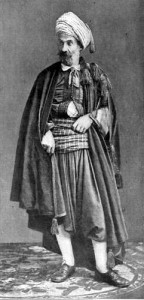At its core, Archaeology is about the formation of identities. One aspect of this is the formation of national identities. In Professor Sarah Abrevaya Stein’s lecture, “Decolonization and the Jews of the Sahara: National Myth Making in Israel, Algeria, and France,” she addresses a specific example of this issue by asking who has the rights or control of the Algerian Jews’ past history? In order to answer this, one has to take into consideration the historical and archaeological records. However, due to nationalism, archaeology and history can often be misused for a country’s own benefit.
After the Algerian War of Independence, the French government wanted to allow Jews from both North and South Algeria to immigrate to France. The process became complicated and messy since before the war the French created a huge divide between the North and South Jews. They granted the North Jews legal status so that they could become French citizens. The South Jews, however, were much more resistant to French control. Therefore, France did not give them legal rights. This lack of documentation for the South Jews became a critical issue after the war since they could not immigrate to France without the legal documents. In response, the French government forged new documents for them.
The current debates center on ownership of these documents. France, Algeria, and Israel claim rights to them for the benefit of their own nations. To the French, the Algerians are a part of their history and past. Without the documents, France would lose records of its supposed citizens and colonization and therefore a critical part of its national history and identity. Algeria claims these records since it wants to reverse France’s claims of colonization and retain its people as a part of its history. Israel took offense to the mass exodus of Jews to France instead of Israel. Due to this resentment and tension, Israel wants to claim rights the documents as well. Overall, nationalism underlies the motives of all these countries.
Thus, if archaeology is used to help settle this issue, archaeologists must be objective and implement a scientific method. Nationalism is one of the biggest reasons why archaeology is misused (Feder 11). France, Algeria, and Israel each have their own personal and nationalistic reasons for wanting rights to the documents of the Jews. If the archaeologists are biased by these reasons, then the issue will only become more problematic, and contentious debates will never end.








